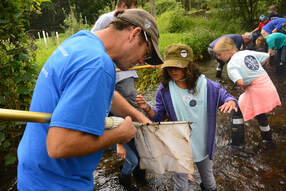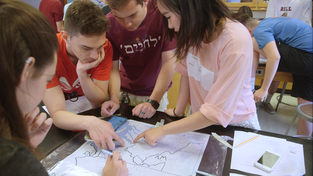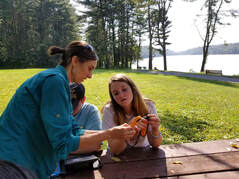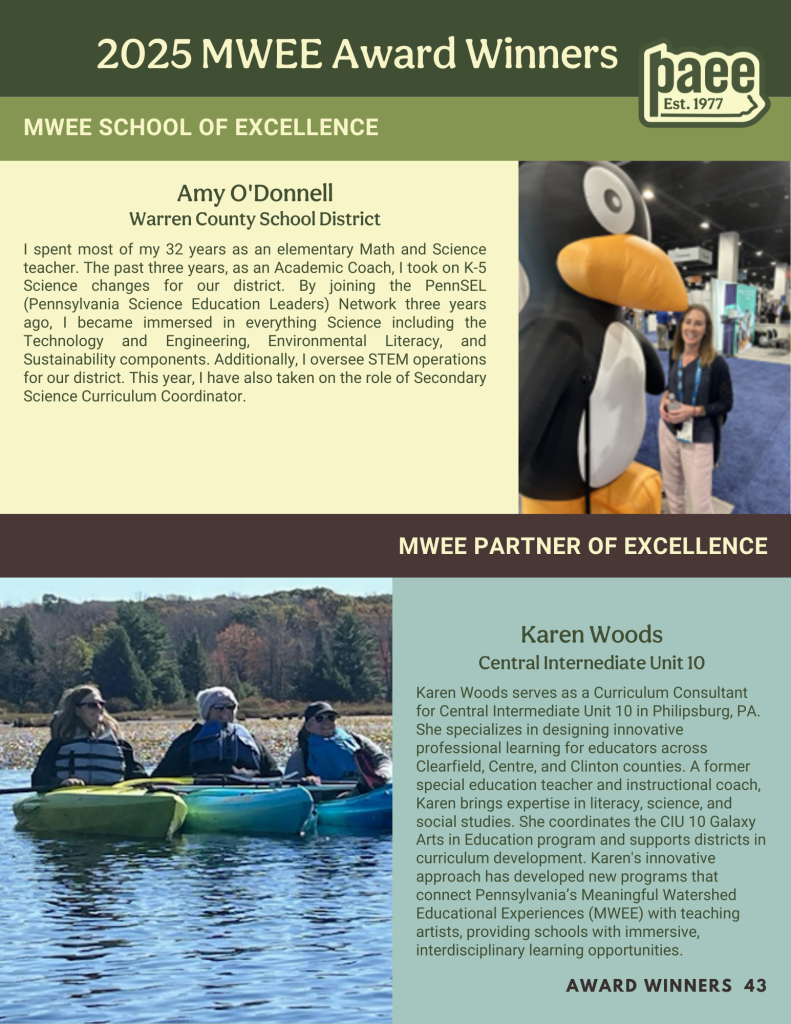Meaningful Watershed Educational Experience (MWEE) Awards

The MWEE Partner of Excellence and the MWEE School of Excellence Award are two annual awards intended to celebrate outstanding support of and/or implementation of the Meaningful Watershed Educational Experience (MWEE) in PA. MWEEs are learner-centered experiences that focus on student investigations into local environmental issues that lead to informed action and civic engagement. In their 2020 pilot year, the awards recognized three non-formal education partners (e.g., municipalities, nature centers, environmental education providers) and three PreK-12 formal educational institutions (e.g., schools or school districts) throughout Pennsylvania. Both awards are part of statewide watershed education capacity-building initiatives of the NOAA-funded (Grant #NA17NMF4570274) Pennsylvania Environmental Literacy and MWEE Capacity-Building Project. For a list of previous winners, please click here. For eligibility and application information, please click here.
All applications must be submitted by Friday, December 12, 2025, 11:59 p.m. EST, via the online application forms (listed below). Selected awardees for both MWEE Awards will be notified via email by Friday, January 9, 2026. Awardees will be formally recognized during the awards banquet at the 2026 PAEE Annual Conference. Selected awardees will be asked to provide 3-4 photos of their MWEE. Applicants should ensure they have permission to distribute and share all photographs.
Both awards are part of statewide watershed education capacity-building initiatives of the NOAA-funded (Grant # NA20NMF4570238) Expanding Environmental Literacy and MWEE Implementation Capacity Across Pennsylvania Project. Please scroll down to read the unique descriptions and eligibility requirements for each award!
Meaningful Watershed Educational Experience
Partner of Excellence Award
The MWEE Partner of Excellence Award recognizes non-formal education partners who have previously demonstrated or are actively demonstrating exceptional partnership(s) with PreK-12 formal educational institution(s) to implement one or more elements of the MWEE.
Eligible applicants should represent an organization larger than themselves or otherwise act as exceptional supporters of MWEE implementation in a PreK-12 formal educational institution, such as an individual school or entire school district. Partners include but are not limited to intermediate units; municipalities and municipal authorities; county conservation districts; government organizations; incorporated non-profit 501(c)(3) organizations; nature centers, non-formal and community-based environmental education (EE) providers; and institutions of higher learning (colleges and universities). Eligible organizations must be serving PreK-12 audiences in Pennsylvania.

This partnership should have occurred between July 1, 2014, and June 30, 2024. Partnerships may have been initiated prior to July 1, 2014, or continued after June 30, 2025, but eligible partners are required to have completed the project(s) during some or all of the required five-year time period.
Meaningful Watershed Educational Experience
School of Excellence Award

The MWEE School of Excellence Award recognizes individual schools or entire school districts (serving any or all PreK-12 students in Pennsylvania) who have previously implemented or are actively implementing all four essential elements of the MWEE. Eligible applicants should represent a PreK-12 formal educational institution in Pennsylvania, including but not limited to individual public schools, private schools, charter schools, parochial schools, and entire school districts that provide school-day or after-school programming and have successfully implemented the four essential elements of the MWEE.
All four essential elements should have been fully implemented between July 1, 2014, and June 30, 2025, even if MWEE implementation was initiated prior to or continued after this time period. The four essential elements include 1) Issue definition and background research; 2) Outdoor field activities; 3) Synthesis and conclusions; and 4) Stewardship and civic action projects. More information regarding the essential elements can be found HERE. Implementation by the applying institution may have occurred independently and internally at the organization, or in partnership with other institutions or non-formal education providers.
2025 MWEE Award Recipients

